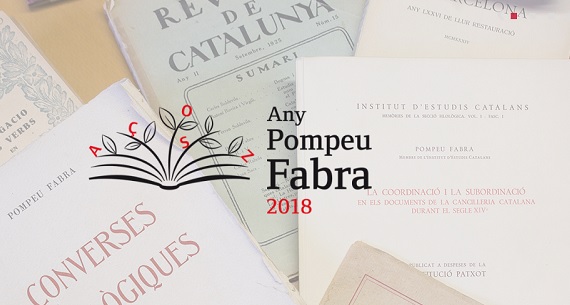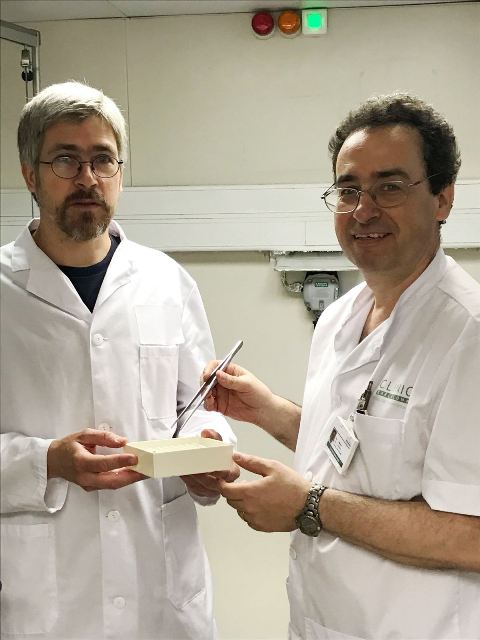A website contains all the activities organized by UPF on occasion of Pompeu Fabra Year 2018
It includes the Pompeu Fabra Portal, the Pompeu Fabra Route, the comic “Pompeu Fabra. The adventure of language”, the MOOC “Getting to Know Catalonia: An Introduction to the Catalan Language, Culture and Society” and the 4th Pompeu Fabra Chair Conference.
This year, 2018, we are celebrating Pompeu Fabra Year, in honour of Pompeu Fabra (1868-l948), who so brilliantly structured the Catalan language and whose name is borne by our University. He was born on 20 February, 150 years ago.
 UPF, through the Pompeu Fabra Chair, directed by Teresa Cabré, emeritus lecturer of the University, is organizing various activities and events to remember the Maestro and make both the person and his work known.
UPF, through the Pompeu Fabra Chair, directed by Teresa Cabré, emeritus lecturer of the University, is organizing various activities and events to remember the Maestro and make both the person and his work known.
These activities, contained in a recently set up website, are related to different fields, such as literature, cultural discovery, Fabra’s influence abroad, and online teaching.
They form part of Pompeu Fabra Year 2018, an extensive programme promoted by the Government of Catalonia, curated by Jordi Geneva, professor of Catalan Philology at Rovira i Virgili University.
This initiative aims to commemorate the 150th anniversary of the birth of the Maestro, who codified and standardized modern Catalan, and the 100th anniversary of the publication of Gramàtica catalana (Catalan Grammar), one of his main works.
A literary portal, a cultural tour, a comic, a MOOC and an academic conference; several ways to get to know Pompeu Fabra
The Pompeu Fabra Portal includes the complete works of Fabra in digital format. It allows access to each of the works by the Maestro and allows you to search a string of characters (a word or set of words) in all his works, in works within the same category, or a specific work.
The Pompeu Fabra Route consists of a cultural tour of Barcelona, on foot, concerning the most important events in the life and work of Pompeu Fabra. It stops at seven places related to the Maestro’s childhood, studies and leisure as well as his relationship with L’Avenç, the Ateneu, the Centre Excursionista de Catalunya and the Institute of Catalan Studies.
The comic “Pompeu Fabra. The adventure of language”, by Oriol Garcia Quera (illustrations) and Gemma Pauné Xuriguera (script and text) is published by Rafael Dalmau Editors, within the collection El traç del temps. The comic will be presented on 14 March 2018 at the Institute of Catalan Studies.
The new MOOC Getting to Know Catalonia. An Introduction to the Catalan Language, Culture and Society (registrations open) will get under way on 2 April. It seeks to present the Catalan language and culture to all those interested and, in particular, to international students joining UPF and the Catalan university system in general.
Finally, the Fourth Conference of the Pompeu Fabra Chair will be dedicated to the work of Pompeu Fabra, both in and outside of Catalan-speaking regions.
The website includes a second part on the life and work of Pompeu Fabra. Among other issues, it includes information about his bibliography; language codification; the concept of language; scientific language; translation, literature and commitment; syntax; the formation of words and the relationship of Fabra with the press.
Related Assets
Exploring the genetics of common variable immunodeficiency
A new study led by researchers at Pompeu Fabra University and Hospital Clínic proposes different approaches to the study of a rare disease.

Common variable immunodeficiency (CVID) is a disease characterized by a very low concentration of antibodies and consequently greater susceptibility to infection. It is one of the so-called primary immunodeficiencies and, currently, less than 20% of cases of CVID have a known genetic cause.
A team of researchers, led by Ferran Casals at Pompeu Fabra University (UPF) and Manel Juan at Hospital Clínic - Sant Joan de Déu, has explored possible genetic models for this disease in a new study published in the journal Frontiers in Immunology. The first author of the study is Guillem de Valles-Ibáñez, of the Institute of Evolutionary Biology (IBE: CSIC-UPF) and UPF.
One of their goals was to find the proportion of monogenic cases, that is to say, those caused by altering a single gene. In the study they performed the whole-exome sequencing (i.e., the DNA that provides the instructions to make proteins) of 36 children and adolescents with CVID. The scientists focused on the exome because, despite only representing 1% of the genome, it is where most of the mutations that cause diseases are found.
Ferran Casals, head of the Genomics Service at UPF, explains: “We focused on the study of paediatric patients, where we know there is more chance of finding monogenic cases. In the case of the onset of the disease at later ages, the genetic model is usually more complex”. Manuel Juan, an immunologist at Hospital Clínic in Barcelona, explains that “as it is a rare disease, we had to mobilize professionals from various centres with patients affected by CVID, who came mainly from Sant Joan de Déu in Barcelona, and Vall d’Hebron and La Paz in Madrid”.
The results determined a monogenic origin of between 15 and 24% of cases of CVID, in most of which the disease is caused by a mutation that causes the altered gene to lose its functionality.
This means that in most patients the condition remains genetically uncharacterized. For these patients, they considered other possible, more complex genetic scenarios, such as the possibility that CVID is originated by an oligogenic model, i.e., determined by the combination of several genes. Thus, CVID may be caused by different genetic defects, such as mutations in proteins that interact with the genes implicated in the disease or the accumulation of harmful variants in some immunological pathways.
“In our work we demonstrate the potential of the complete sequencing of the exome as a tool for the study and diagnosis of primary immunodeficiencies. We hope that such studies will also help to detect and understand the key paths related to the development of the disease and of the immune response in general”, concludes Ferran Casals, a researcher with the Department of Experimental and Health Sciences (DCEXS) at UPF.
Interdisciplinary collaboration has been the key to the success of the study, which has involved professionals such as geneticists, bioinformaticians, biologists, immunologists and paediatricians.
Reference article:
Guillem de Valles-Ibáñez et, Ana Esteve-Sole, Mònica Piquer, Azucena González-Navarro, Jessica Hernández-Rodríguez, Hafid Laayouni, Eva González-Roca, Ana María Plaza-Martín, Angela Deyà-Martínez, Andrea Martín-Nalda, Mònica Martínez-Gallo, Marina García-Prat, Lucía del Pino, Ivon Cuscó, Marta Codina-Solà, Laura Batlle-Masó, Manuel Solís-Moruno, Tomàs Marquès-Bonet, Elena Bosch, Eduardo Lopez-Granados, Juan Ignacio Aróstegui, Pere Soler-Palacín, Roger Colobrán, Jordi Yagüe, Laia Alsina, Manel Juan and Ferran Casals. Evaluating the genetics of common variable immunodeficiency: monogenetic model and beyond. Frontiers in Immunology. April, 2018. doi.org/10.3389/fimmu.2018.00636.


